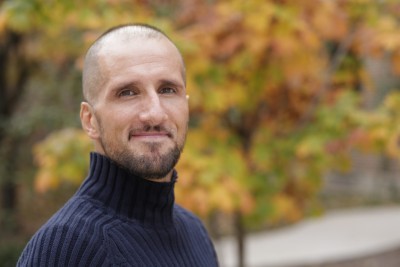
Like many undergraduate students, Dan Wood, MSW 2013, didn't have a clear idea of what he wanted to do with his life. He'd struggled with a lack of focus and motivation throughout his youth, and these same issues followed him into his early college career at Eastern Michigan University. Feeling uninspired and indecisive, Wood left school after his sophomore year to pursue a business opportunity in the indoor air quality industry. The only problem was, after several years on the job, he felt like he was going nowhere.
"It was unsatisfying on so many levels," says Wood, who soon recognized that his personal definition of success meant finding work that challenged him on a deeper level, both emotionally and intellectually. So, at the age of 28, he returned to college to pursue a degree in psychology and complete his business minor. In doing so, Wood finally found the path he'd spent so much of his life looking for.
Wood credits his psychology classes for showing him the way, and more importantly, drawing him outside of himself. The class work, and the feedback he received from professors and peers, confirmed two things for Wood: that he had strong interpersonal skills and, he received enormous satisfaction from helping others.
"The trajectory was never straightforward," says Wood. "I let the ups and downs of life hold me back. Ultimately it was the feeling that I wasn't fulfilling my potential that led me back to school. I found that I liked it and that I was good at it. Learning was so much more fun than when I was younger."
Wood's adolescent "rough patch" is the theme that stuck with him through the years and what led him to social work - and the U of M MSW program. At the age of 36, Wood is one of the oldest students in the program, but he says his age is a non-issue in the classroom and is, in fact, one of the main reasons that he's getting so much out of his classes.
"I'm impressed by these students," he says. "They're so thoughtful, articulate, self-assured, and undaunted by the challenges they're encountering, and I admire them. What's interesting though - and ironic - is that because of my age, they look up to me. I really relish being able to help them. They challenge me and because of this, they've helped me uncover strengths that I previously didn't recognize in myself."
One of the previously undiscovered strengths that Wood is referring to is Group Therapy Facilitation. It has been the most challenging aspect of his field placement and the most valuable to him, both in his educational journey and for his future as a social worker.
"I've always felt comfortable with individual counseling, but my field work is teaching me about group dynamics," says Wood. "Between my MSW classes and my field placement, I am getting a truly comprehensive and balanced education, which in turn will make me a well-rounded counselor."
Wood is a group therapy co-facilitator for adults aged 18 years and older who are battling issues such as depression, anxiety, and suicidal thoughts, to name a few.
"It's gratifying work," Wood says of the group sessions. "These patients are surrounded by others struggling with the same life issues, and it makes them feel less alone. Seeing others who are further along in the coping or recovery process gives them a feeling of belonging and a sense of hope that they might not get when talking to an individual counselor or doctor."
Working in a group therapy setting has expanded Wood's view of his own role in the field of social work. Wood is increasingly interested in working in a clinical setting that accommodates both individual and group therapies. In particular, he wants to work in an urban setting with at-risk adolescents much like the one Wood himself once was.
"It's where I see myself making the most impact," he says. "I feel very comfortable around young people, and it comes across to them. They know I've been in their shoes and it rings true with them. It's never easy to ask for or accept help and support, and that's especially true of adolescents. There's a stigma attached to it, and I know what that's like. I can help them break through that stigma."
Open to moving to any large city after graduation, Wood knows that for right now, he's in the right place in Ann Arbor.
"I never thought I'd have the opportunity to attend U-M, so I feel incredibly fortunate to be here," he says. "Being surrounded by the right professors, the right people, with the same values and heart, has taught me that what's most important to me is helping others. And my field placement just solidified it for me."